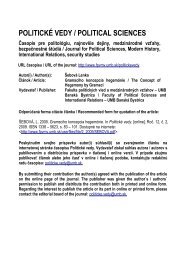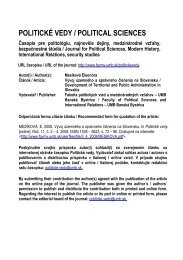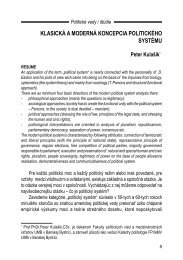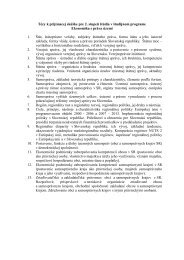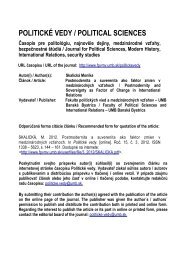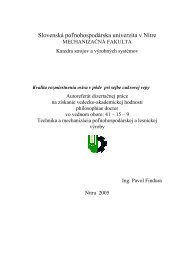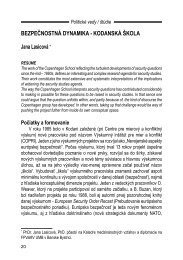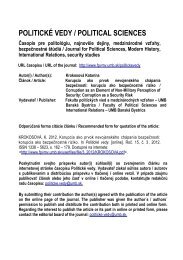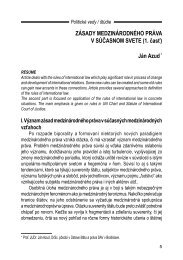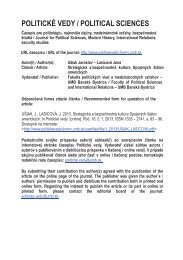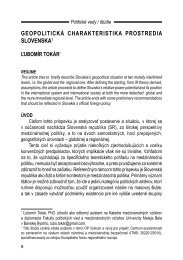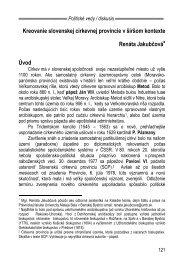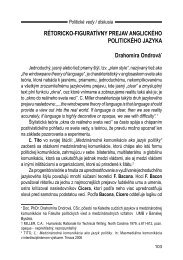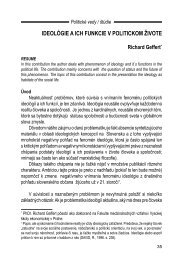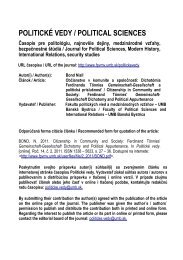MRAVNÃ VÃCHOVA V Å KOLÃCH NA SLOVENSKU A V ZAHRANI ÄÃ
MRAVNÃ VÃCHOVA V Å KOLÃCH NA SLOVENSKU A V ZAHRANI ÄÃ
MRAVNÃ VÃCHOVA V Å KOLÃCH NA SLOVENSKU A V ZAHRANI ÄÃ
Create successful ePaper yourself
Turn your PDF publications into a flip-book with our unique Google optimized e-Paper software.
moral education and pedagogy. We attempted to provide an input into discussion on this topic as well<br />
as to provide inspiration for Slovak environment with Premeny etickej výchovy v európskom kontexte<br />
(Changes of Ethical Education in the European Context) - the first monograph of the kind that was<br />
published in 2008. The monograph contains a chapter providing basic outlines of a conceptual<br />
discussion that took part in the USA in 1921 – 2006. Its main aim is to provide relevant information on<br />
the issue of moral education outside Europe, where the “moral and values crisis” has been discussed<br />
for several decades. (POLIACH, V.: 2008, s. 229 et seq.)<br />
On the basis of our up-to-now findings, surveys and experience of a relevant grant project it seems that<br />
the basic intersection point of problems where the pros and cons of the current ethical education<br />
concept in Slovakia and also of equivalent disciplines in selected European countries meet is the<br />
widest dimension of educational processes, i.e. the social (societal) level. In context of the globalizing<br />
European (in a simplified way worldwide) development these fundamental connotations of basic<br />
ethical (moral) education concepts are outlined:<br />
a) historic-cultural, ideological, political and economic determinants,<br />
b) educational theoretical concepts and actual school (educational) practice in relevant regions and<br />
countries,<br />
c) terms structure, basic aims and contents of ethical (moral) education. (See KORIM, V.: 2008)<br />
A special phenomenon that is becoming more and more important, and whose basic outlines only<br />
started to appear in the period of creation of ethical education concept in Slovakia, is the general moral<br />
and values crisis. The crisis is today visible also in Slovakia. It has been scientifically documented in<br />
the survey research of professor Juraj Schenk. He used the questionnaire method to interpret<br />
respondents´ opinions on the most significant manifestations of anomie in Slovak society. Due to its<br />
relevance to our topic, we present six most frequent manifestations of anomie:<br />
1. An individual never gets justice.<br />
2. There are not any clear and exact rules valid in this society.<br />
3. Majority of people seek fortune recklessly.<br />
4. If an individual needs help, they never get it.<br />
5. People believe in nobody and nothing.<br />
6. Children, the weak and the ill do not receive enough care. (SCHENK, J.: 2004)<br />
The co-author of the ethical education concept in Slovakia, Mgr. Ladislav Lencz, states in connection<br />
with this research that these manifestations of anomie are expressions of the missing pro-social<br />
behaviour of people in public life. I agree only partially as there are several reasons for the state of the<br />
Slovak society and some of them are stronger than just absence of pro-sociality.<br />
I think that in the present state of knowledge of the ethical (moral) education issue, several topics can<br />
be determined in terms of its profile, practice and needs of pedagogical research:<br />
1. Analysis of the current concept and state of the subject ethical education in Slovakia and the EU.<br />
2. Basic factors, motives and circumstances of creation of the subject (or its equivalents) and its<br />
introduction into the education in Slovakia and the EU.<br />
3. Analysis of aims and curricula of ethical (moral) education and its equivalents in Slovakia and the<br />
EU.<br />
4. Competencies of teachers and preparation of future teachers of ethical (moral) education or of its<br />
equivalent disciplines in Slovakia and the EU.<br />
5. Quality of methods, procedures, forms and means of ethical (moral) education (and its equivalent<br />
disciplines) and their connection with practical life of school, family, public and society (civic<br />
participation) (in Slovakia and the EU).<br />
297



